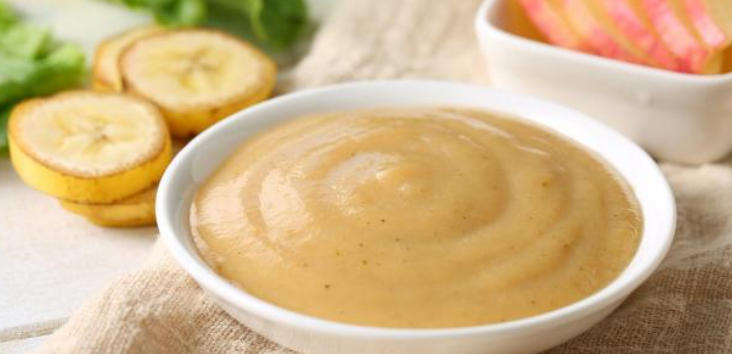In the seventh month, what should a baby eat?
Baby feeding in the seventh month: From the seventh month, the child begins developing its independence and personality, and solid food with new textures should be introduced to the child. At this stage, there is no need to rush, as the child needs time to adapt to new foods and textures, and some children still use breast milk or formula as their primary source of nutrition. Nutrition is essential for them. It is generally accepted that children have different needs, and a mother should feed her child according to the child’s needs and development.

Seven-month-old baby foods
The child should receive a complete diet so that he can prepare food from all food groups, as follows:
Vegetables and soft fruits that have been cooked
The baby can eat steamed vegetables such as peas, beans, cauliflower, broccoli, sweet potatoes, carrots, and beets in the seventh month. You can also eat green leafy vegetables, such as spinach, and soft fruits, such as cantaloupe. You can serve watermelon, pear, mango, and banana. The following tips will help you introduce vegetables and fruits to your baby in the seventh month:
Start with pureed fruits and vegetables and introduce a new type of food every 3 to 5 days. It is not recommended to eat fruit desserts or fruit mixes that contain added sugar.
There is no need to add salt, sugar, syrup, oil, butter, or other fats to fruits and vegetables without additives.
Cut or mash the fruits into small pieces after removing the cores and seeds.
Cereals and starchy foods that are suitable
To get the right texture, starchy foods can be cooked and mashed, and cereals can be mixed with breast milk or infant formula. The following starchy foods are suitable for children: potatoes, rice, pasta, barley soup, oats, corn starch, quinoa, and bread.
Foods high in protein
Protein can be found in animal sources such as meat, poultry, boneless fish, and well-cooked eggs. Plant sources of protein include lentils, legumes, peas, beans, chickpeas, ground nuts or seeds. In addition to almonds, peanuts, walnuts, and cashews, here are some tips to keep in mind when introducing protein-rich foods to babies in the seventh month:
Use drained and pureed meat when introducing the food to the baby, and if the mashed meat is too thick, mix it with breast milk or formula.
Make sure each ingredient in the mixture has been tested separately and the child does not have an allergy reaction to any of them before mixing meat and vegetables together.
Dairy products in small amounts
From the sixth month, you can use cow’s milk for cooking, but you should wait until the child is one year old to give him cow’s milk as the main drink, and until then, breast milk or formula are the best choices.
In the seventh month, the number and quantity of meals the child ate
At the age of 6-8 months, complementary food should be given to children two to three times a day, and the amount of food a child eats should be gradually increased over time as his appetite grows. It is normal for a child who is still learning to eat to eat a lot on some days and a little on others, as he or she grows and can eat three meals per day until eight or nine months old. The following amounts are recommended for babies in the seventh month to get used to new foods:
3-5 times a day, or about 880-940 ml of milk.
3-5 tablespoons of iron-enriched dry cereal can be mixed with milk for babies.
1-2 tablespoons of mashed fruits twice a day.
Twice a day, eat 2 to 3 tablespoons of mashed vegetables.
You should consume 1-2 tablespoons of mashed protein foods twice a day.
Seventh-month baby foods and drinks to avoid
These foods and drinks should be avoided by the baby during the seventh month, as they may be harmful to him:
In children under the age of 12 months, honey can cause botulism and is a dangerous food poisoning.
Unpasteurized drinks and foods: such as juice, milk, yogurt, and unpasteurized cheese, may put the child at risk of infection. Foods that have not been fully pasteurized.
Cow’s milk that has been fortified: Babies under 12 months of age are at risk of intestinal bleeding when they drink large amounts of cow’s milk because it contains a large amount of protein and minerals that are hard for their kidneys to handle. This is not appropriate. At this age, cow’s milk should not be given to the child in large quantities and as the sole drink, but rather breast milk or milk powder should be used instead.
Drinks containing a lot of sugar, such as soft drinks, milkshakes, and fruit juice, should be avoided to reduce the risk of tooth decay, and beverages meant for children and babies may also contain a lot of sugar.
A child under the age of 5 should not be given whole nuts as they can cause choking, but nuts and peanuts can be given to them as long as they are crushed and ground or in the form of butter like peanut butter. A doctor should be consulted before giving nuts to a child if the family has a history of food allergies to nuts or any other type of allergy.
Children should not consume a lot of salt because it is not useful and appropriate for all children, so salt should not be added to food or used in cooking water to prepare baby food, which should be noted when serving. As similar foods are often high in salt, they should be avoided.
The nutritional value of refined grains differs from that of other carbohydrates. Refining whole grains removes nutrients from complex carbohydrates. It is also recommended to avoid refined grains because whole grains are rich in fiber, which helps stabilize blood sugar levels. As much as possible, choose white bread, white rice, and whole grains like pasta and whole grain bread.
Smoked or processed meats, such as bacon, contain nitrates and other chemicals, as well as large amounts of sodium and animal fat. Children should avoid processed meats whenever possible.


